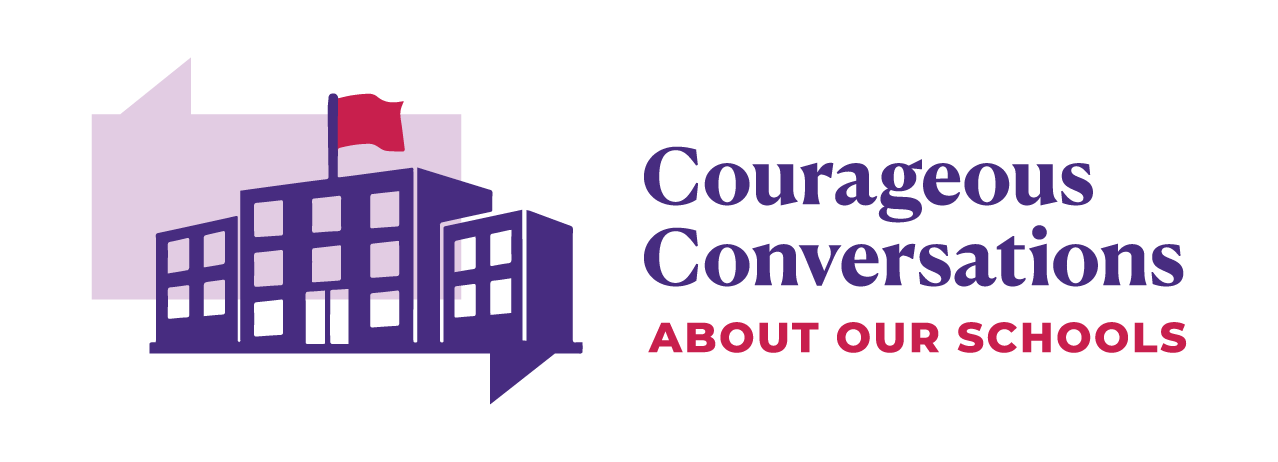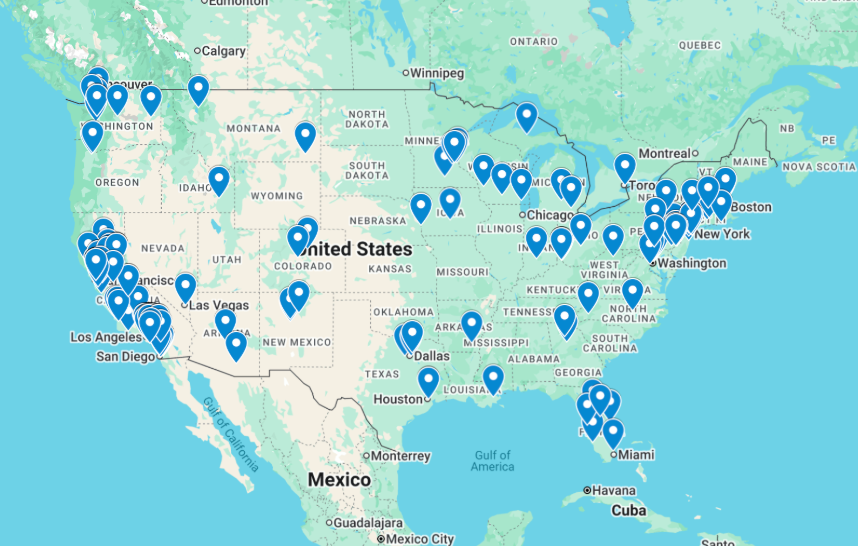Ethnic Studies for High School Students
On September 4th, 2025, we, and our co-host Braver Angels, conducted a live, interactive discussion with eight panelists about the teaching of Ethnic Studies in high school. Nearly 300 people from across the country registered — teachers, parents, students, board members, policy makers, journalists, and community members. Based on audience participation, the question of how students should learn about culture and ethnicity is one that resonates and generates strong feelings.
Our panel featured eight members who shared their personal reflections and honest concerns in a "fishbowl" format. The discussion revealed that the question of how students should learn about culture and ethnicity is a topic that resonates deeply and evokes strong emotions.
Panelists were asked to listen, be curious, and interact with one another respectfully. The conversation was lively and illuminating, and challenging at times, but it exemplified the value of meaningful dialogue that is essential for productive discourse on controversial topics like this one.
A particularly noteworthy moment occurred near the end when Niclole Bernstein, a panelist opposed to Ethnic Studies, expressed a desire to continue the conversation with Albert Camarillo, one of four panelists in support of the course. They agreed to let us record that conversation, which you can listen to here.
In our post-event survey, eighty-eight percent of the respondents said they would recommend this event to others. A few comments from the audience:
I loved the fishbowl format. We need to use this more often.
There are no easy answers to the ethnic studies dilemma. And people have very strong feelings! But it was very nice and refreshing to see a respectful dialogue about a contentious subject—well done!
There are some very strong opinions on this topic. Listening to those with a different viewpoint from mine helped me see things through their eyes.
Listen or watch the FULL Recording 📺
If you missed any part of the event or want to share it with colleagues and friends, you can listen or watch the recording using the links below.
Chapters:
0:00 - 8:40 Welcome and discussion overview
8:40 - 18:15 EdSource Journalist provides background on California's Ethnic Studies Course
18:15 - 40:28 Panelists in support of Ethnic Studies
42:00 - 51:50 Q&A with panelists in support of Ethnic Studies
51:50 - 1:17:20 Panelists concerned about Ethnic Studies
1:17:20 - 1:34:25 Q&A with panelists concerned about Ethnic Studies
1:34:25 - 1:53:50 Takeaways from panelists
1:53:50 - 1:55:31 Acknowledgements and closing comments
A Nationwide Gathering 🌎
The discussion focused on California's Ethnic Studies course for high school students. The participant map below shows how much the topic (and, perhaps, how we structured the exchange of ideas) resonated beyond California’s borders.
The Conversation Provoked Excellent Questions
Our audience did not hold back. Their questions sought clarity on terms and answers to complex problems. A few examples:
Please define what you mean by Ethnic Studies.
How can we avoid oversimplifying history?
How can we prepare teachers to ensure it's taught well?
What role should parents play in shaping the curriculum?
How do we reconcile differing community perspectives on what history should be taught?
There are over a thousand different ethnic groups in California. How can teachers possibly teach about all of them?
Several excellent questions were submitted that could not be answered during the live event.
These questions and the answers provided later by some of the panelists can be found here.Voices from the Chat 💬
The chat filled quickly with comments that revealed both passion and tension. A few that stood out:
Teach history honestly. Encourage people to dialogue and learn from each other.
Some people think that learning about other cultures takes away from the basics in schools.
High-quality staff development is key.
What You Told Us Afterwards
Your feedback confirms how meaningful the event was. Some of it also provided constructive suggestions:
Outstanding event!!! We need to do more of these.
The format was great.
I always enjoy it when opposite sides of an issue can discuss issues with each other, rather than in echo chambers.
I wish these webinars were not framed as "conversations" and definitely not "courageous" ones. I see them as polite turn-taking, at best.
I think it would be very interesting if you could prepare panelists to ask one another curious questions and model engagement and constructive conversations. People want models and skills of engagement. This was a series of speeches for and against a topic.
Ethnic Studies opponents want to keep the conversation going.
Two Panelists on Opposite Sides of the Ethnic Studies Debate Want to Continue the Conversation (Ep 48)
Nicole Bernstein and Albert Camarillo, panelists on opposing sides of the issue, agreed to participate in a recorded follow-up discussion with Ken Futernick and Mary Thomas-Vallens from Braver Angels. Listen to it here or view the video here on our YouTube channel.
More About This Courageus Conversation
CO-HOST
EVENT SPONSORS
Courageous Conversations about our Schools and Braver Angels are both committed to the idea that our communities, our country, and civic institutions like our public schools benefit when interested parties listen to one another, have healthy disagreements, and treat those who disagree with us with dignity rather than contempt.
Together, we conducted a live, online event to hear multiple perspectives about the ethnic studies course that all high school students would be required to pass starting in 2030.
A little background...
In 2021, California Governor Gavin Newsom signed a bill that would make Ethnic Studies a required course for high school graduation, starting in 2030. At the time, the policy was relatively uncontroversial and had received bipartisan support. Now, its future is anything but certain, partly because funding for implementation of the course was not included in this year’s state budget. In addition, a growing number of Californians are now pushing back on whether such a course should be required or even offered at all in high school.
The format for the conversation on September 4th was a “fishbowl” and not a debate. The purpose was to allow participants and audience members to better understand the complex set of issues surrounding this policy and multiple perspectives from individuals who support and oppose it.
After introductions, John Fensterwald, a reporter for EdSource, took a few minutes to provide background on AB101, the bill that was passed into law in 2021, and described its current status as of September 2025.
Panelists who support and oppose California’s required ethnic studies course for high school students each had 5 minutes, without interruption, to respond to these two questions:
What are your perspectives on requiring high school students in California to complete an Ethnic Studies course for graduation?
What concerns and reservations do you have about your own position on this question?
Audience members will be invited to submit questions to the moderators, who will pose a few of them to the panelists.
After both groups have shared their views and responded to questions, the panelists and audience members will be invited to share their impressions of the conversation.
Supporters of Ethnic Studies Courses
Karen Ridley, a veteran English Language Arts teacher at Loara High School in Anaheim, California, where she is recognized for her commitment to equity, literacy, and student empowerment.
Samantha Garcia, a recent high school graduate from Compton, California.
Albert Camarillo, a History Professor at Stanford University and author of numerous books, articles, and essays dealing with the experiences of Mexican Americans and other racial and immigrant groups in American cities.
Summer Johnson, Ethnic Studies Teacher at Arise High School in Oakland, California.
Concerned about Ethnic Studies Courses
Wenyuan Wu, Executive Director, Californians for Equal Rights Foundation. Dr. Wu has been interviewed by the Wall Street Journal, NBC News, NPR Boston, Boston Globe, Quartz, EdSource, College Fix, and other prominent news sources. Her written work has been published by CalMatters, the Orange County Register, and other publications.
Tab Berg, founder and president of TABcommunications. He has authored numerous articles for dailies, including The American, San Francisco Chronicle, San Diego Union Tribune, Sacramento Bee, Silicon Valley and Sacramento Business Journals, and the North County Times.
Phil Stemler, a 2024 school board candidate in Newport-Mesa. His campaign platform centered on empowering parents and ensuring local schools are dedicated to academic excellence. He is a public corruption prosecutor born and raised in Newport Beach, CA.
Nicole Bernstein, Parent advocate, co-founder of Peer K12, and author of several articles opposing the Ethnic Studies course.
CONTACTS FOR QUESTIONS/COMMENTS
Ken Futernick, Co-moderator and Host of Courageous Conversations about our Schools (ken@schoolconversations.org)
Mary Thomas Vallens, Co-moderator and staff member at Braver Angels (marytv@braverangels.org)







